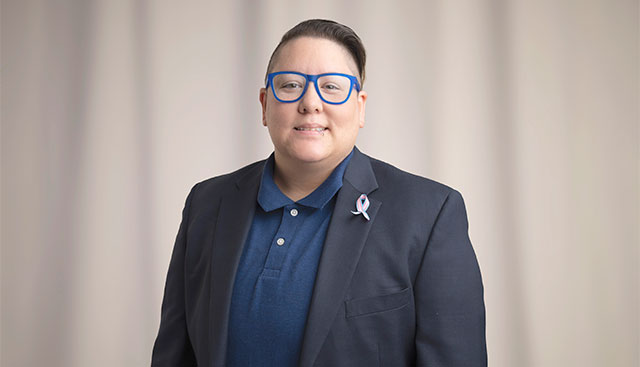
Patient Story: Being Nonbinary
By Jen Poblete-Scaglione
Patient
As an assigned female at birth, I had the usual menstrual cycles every month. I started having irregular cycles with light bleeding between weeks, which slowly turned into daily light bleeding. I chalked it up to stress. The summer went by and I discovered a mass. I didn’t think too much of it. I wasn’t in pain. It was just uncomfortable. Finally, my wife told me to set up an appointment and get checked by a gynecologist, so I did.
It started out routinely and then I brought up my concern, the irregular bleeding. After an exam and an unexpected trip to the emergency room, the doctor placed a call to Moffitt and got me an appointment two days later.
"Assigned female at birth" means when I was born my gender was noted female based on my biology. Just like how the seasons change my gender identity has also changed. Here I am now, 34 years later, scooting along the gender spectrum and living my authentically proud self as a nonbinary transmasculine person. Breaking that down, it means nonbinary: not identifying as either fully male or female, outside the gender binary.
Trans: identifying under the transgender umbrella. Masculine: leaning and presenting more masculine than feminine. But what does this have to do with my cancer journey? It means that along with the uncomfortableness that is cancer itself a heightened sense of dysphoria tags along. While undergoing treatment parts of me were constantly looked at. I’m not ashamed of my parts nor do I hate them or wish they weren’t there. I just wish I didn’t have to pay so much attention to them. Enter my Moffitt care team. Right off the bat, I knew I was in a safe place not just physically but mentally. I knew my care team didn’t judge me. Everyone I’ve met, including volunteers and nonmedical staff, has accepted and welcomed me with open arms. When someone is sick the last thing they want to worry about is how their medical team is going to view them. People like me want to be treated like any other patient regardless of their sexual orientation and/or gender identity.
I was never formally asked what pronouns I use but there is an online form that asks what your pronouns are. My pronouns are they/them/he/him but I’m also OK with she/her. My main goal was to work with my care team so I can get better and so they can provide the best care for me during my treatment and recovery. I consider myself lucky because not all trans/nonbinary people are accepted and well-cared for. Some avoid any sort of medical appointments for fear of being rejected or discriminated against.
I share my story because I hope someone like me will connect with it and feel good knowing Moffitt cares for the whole person, not just the cancer-affected area. My hope is also that the medical community continues to learn and educate itself on LGBTQ+ health care, specifically transgender and nonbinary. There are too many people in the community who are scared to go to the doctor because they may not identify with their birth assignment and fear being turned away or judged. To the trans and nonbinary community, it is incredibly important to continue or start going to yearly wellness appointments. Ask someone to go with you, research doctors, find LGBTQ+ accepting offices and use local resources for recommendations. Your health is important and you don’t want to end up with a cancer scare like I did. As of right now, I am not 100% cancer-free, but we’re headed in the right direction.
